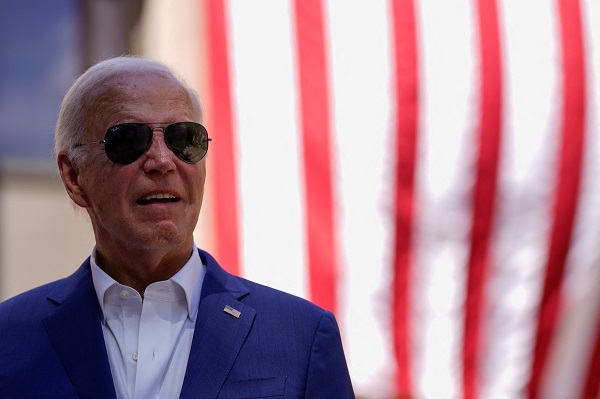 US President Joe Biden attends a campaign event in Harrisburg, Pennsylvania, US, 7 July 2024;
Credit: Reuters/Nathan Howard
US President Joe Biden attends a campaign event in Harrisburg, Pennsylvania, US, 7 July 2024;
Credit: Reuters/Nathan Howard
WASHINGTON (Reuters) - President Joe Biden vowed to push on with his re-election bid on Monday 8 July 2024, dismissing the concerns of some fellow Democrats on Capitol Hill and donors that his persistence could cost their party the White House and Congress in the US election on 5 November.
Biden, 81, said any candidates who doubt his ability should challenge him at the Democratic National Convention in August - an effort that stands no chance of success unless he lets the delegates he won in primaries this year consider other candidates.
"The bottom line here is that I am not going anywhere," Biden said in a phone call he placed to MSNBC's Morning Joe programme. He repeated that message to donors on a private call later in the day, according to two sources on the call.
Biden faces a critical week as he tries to shore up a campaign that has been on defense since a shaky 27 June debate against Republican Donald Trump, which raised questions about his ability to do the job for another four and a half years.
Several congressional Democrats have called for him to drop out. A larger number have voiced concern that worries about his age and ability, on top of Biden's poor public approval ratings, could hurt their prospects for retaining the Senate, which they control by a 51-49 majority, and winning back the House, where Republicans have a 219-213 edge.
Democratic Representative Adam Smith released a strongly worded statement calling on Biden to step aside after his "alarming" performance on the debate stage and "unacceptable" response in the days since.
"Any candidate for the highest office in our nation has a strong burden to bear," Smith said. "That candidate must be able to clearly, articulately and strongly make his or her case to the American people. It is clear that President Biden is no longer able to meet this burden."
Senator Dick Durbin, the chamber's No. 2 Democrat, told reporters Biden's candidacy "will be thoroughly discussed this week, as it should." He said he had spoken with about a dozen of his colleagues, who held a range of views.
Another Democrat, Representative Joe Morelle, said many of his constituents had told him they worried Biden was not capable of serving as president, though he stopped short of calling on Biden to drop out.
"The bigger question is, how does he dispel concerns that were raised from his performance in the debate?" Morelle told reporters.
A number of Democratic lawmakers said the answer was for the campaign to give Biden more unscripted moments in front of voters.
"Let Joe be Joe," Senator Alex Padilla said.
Biden's halting debate performance has prompted some to question whether he was suffering from a neurological disorder such as Parkinson's disease, which can cause slurred speech and halting movement.
White House spokesperson Karine Jean-Pierre said Biden was given a clean bill of health in February and is not being treated for the disease. Biden's doctor has said further testing is not warranted, she said.
If Republicans were to capture the White House and both houses of Congress, Trump would face few constraints on his ability to push through major policy changes.
"Biden is the nominee"
Some lawmakers said they still supported his candidacy.
"President Joe Biden is the nominee and has been selected by millions of voters across this country," Representative Steven Horsford, chair of the Congressional Black Caucus, said on social media. Black voters are a critical part of Democrats' base of support.
In his letter to Democrats, Biden said he was aware of their concerns but said it was time to put them aside.
Biden will have little time to campaign this week as he hosts a meeting of NATO member states, capped with a rare solo press conference on Thursday.
A Reuters/Ipsos poll last week found that one in three registered Democratic voters believed that Biden should quit the race, with 59% of respondents in the president's party saying he is too old to work in government.
However, that poll also found that none of his possible replacements fared better in a matchup against Trump. The poll found Biden and Trump tied at 40% each.
Biden's troubles appear to be increasing the number of races Democrats need to worry about in November.
Internal party polling shows that New Mexico and Virginia became more competitive following the debate, according to a source familiar with the findings, and the nonpartisan Center for Politics at the University of Virginia last week shifted its ratings on the states of Michigan and Minnesota to make each slightly more favourable for Republicans.
Together, those states will host a half-dozen of the most competitive House races.








